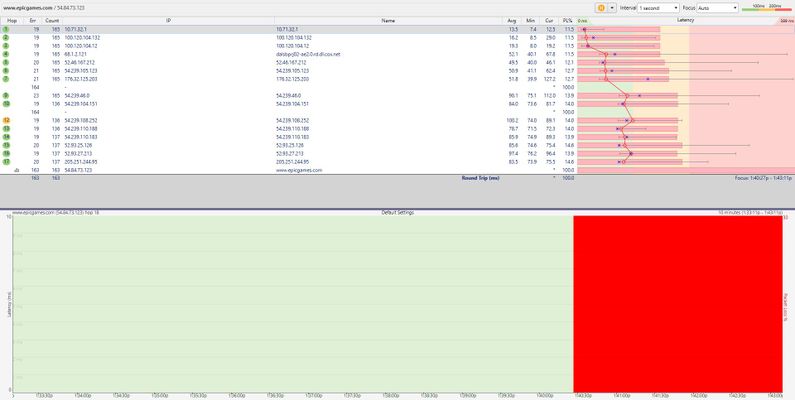Packet Loss Southern California (Fortnite)


I believe it is connected with AWS, here is a tracert to AWS west (52.42.109.244)
over a maximum of 30 hops:
1 <1 ms <1 ms <1 ms 192.168.1.1
2 16 ms 9 ms 10 ms 10.71.32.1
3 18 ms 9 ms 9 ms 100.120.104.132
4 11 ms 12 ms 25 ms 100.120.104.12
5 36 ms 12 ms 19 ms 68.1.1.167
6 10 ms 11 ms 14 ms 52.95.218.216
7 36 ms 20 ms 25 ms 54.239.102.66
8 10 ms 19 ms 13 ms 54.239.102.73
9 36 ms 35 ms 39 ms 54.239.42.118
10 * * * Request timed out.
11 48 ms 53 ms 38 ms 52.93.13.6
12 35 ms 44 ms 49 ms 52.93.12.249
13 58 ms 60 ms 75 ms 52.93.12.248
14 38 ms 36 ms 37 ms 52.93.13.25
15 37 ms 54 ms 36 ms 52.93.240.77
16 * * * Request timed out.
17 * * * Request timed out.
18 * * * Request timed out.
19 * * * Request timed out.
20 * * * Request timed out.
21 * * * Request timed out.
22 * * * Request timed out.
23 * * * Request timed out.
24 * * * Request timed out.
25 * * * Request timed out.
26 * * * Request timed out.
27 * * * Request timed out.
28 * * * Request timed out.
29 * * * Request timed out.
30 * * * Request timed out.
So you can't fix this problem cox?
So can you explain why this fix goes away when i go to a iphone hotspot or go to a friends house with cox and I don't get packet loss there?
In Ping Plotter, you can adjust the trace route protocol. Try switching from normal "ping" requests to UDP packets.
This can be found under "Edit" --> "Options" --> "Packet" - change the "Packet Type" option to "UDP Packets".
Cox likes to deflect blame when packet loss is occurring by arguing that normal trace route data is invalid because some hops drop normal ping requests due to them being low priority. While is can be true, changing the packet type will avoid this blame game entirely.
UDP packets are usually connectionless packets in that they do not return a reply. However, when UDP packets are sent to a normally unused UDP port number, the system sending the UDP packet will receive a reply from the destination server essentially saying "UDP packet recieved, but invalid port" - thus showing accurate, non-deprioritized packet travel and undoubtedly showing valid packet loss data.